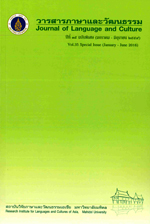Language and ideologies: Breastfeeding discourse in social online
Main Article Content
Abstract
The study explores critical discourse analysis (Fairclogh,1995 and Van Dijk, 1995) to Social Network Sites by examining how motherhood ideology in Thai society are constructed on Facebook, a newly emerged online social networking site which has become most popular. It focuses on public page “Sutheera Uerpairojkit” on Facebook. The objectives are 1) how linguistic strategies are presented in breastfeeding discourse on Facebook page, and 2) how the linguistic strategies reproduce motherhood ideology in Thai society. The data are collected from August to December 2014. It found that the linguistic strategies are divided in to 2 types: 1) semantic strategies such as the use of comparative words, the use of negate words, and 2) pragmatic strategies such as speech act, presupposition. It represents that breastfeeding is the best for their child. As the result, it enacts and reproduces motherhood ideologies, mother roles in modern society which struggles in old values
Article Details
The articles featured in the Journal of Language and Culture (JLC) constitute academic works representing the viewpoints of the respective author(s). It is crucial to note that these opinions do not necessarily reflect those of the Editorial Board.
All articles published in JLC are released under the Creative Commons Attribution 4.0 International License (CC BY 4.0). This license grants permission for unrestricted use, distribution, and reproduction in any medium, provided proper credit is given to the original author(s) and the source.
References
Ellison, N. Steinfield, C. & Lampe, C. (2007).The Benefits of Facebook 'friends': Exploring the Relationship between College Students' Use of Online Social Networks and Social Capital. Journal of Computer-mediated Communication, 12(3).
Fairclough, N. & Wodak, R. (1997). Critical Discourse Analysis. In T.A. Van Dijk. (ed.), Discourse as social interaction. London: Sage.
Halliday, M. A .K. (1985). An introduction to functional grammar. London: Edward Arnold.
Jin, S. V., Phua, J. & Lee, K. M. (2015) Telling stories about breastfeeding through Facebook: The impact of user-generated content (UGC) on pro-breastfeeding
attitudes. Computers in Human Behavior, 46(2015), 6-17.
Levinson, S. (1983). Pragmatics. Cambridge: Cambridge University Press.
Nastri, J. & Jorge Pena, J. T. (2006). The construction of away messages: A Speech Act Analysis. Journal of Computer Mediated Communication, 11(4).
Rambe, P. (2012). Critical discourse analysis of collaborative engagement in facebook posting. Australasain Journal of Educational Technology, 28(2), 295-3.
Searle, J. R. (1969). Speech Acts. Cambridge: Cambridge University Press.
Simpson, P. (1993). Language, ideology and point of view. London: Routledge.
Van Dijk, T. A. (1995). Discourse analysis as ideology analysis. In C. Schaffner & A. Wenden (eds.) Language and Peace. Aldershot: Dartmouth,
Van Dijk, T. A. (1998). Ideology: A Multidisciplinary Approach. London Sage.
Van Dijk, T. A. (2006). Discourse and manipulation. Discourse and Society.
Wall, A. (2001). Moral constructions of motherhood breastfeeding discourse. Gender and Society, 15(4), 592-610.
Zhao, S. Grasmuch, S., & Martin, J. (2008). Identity construction on facebook: Digital empowerment in anchored relationships. Computers in Human Behavior, 24(2008), pp.1816–1836


